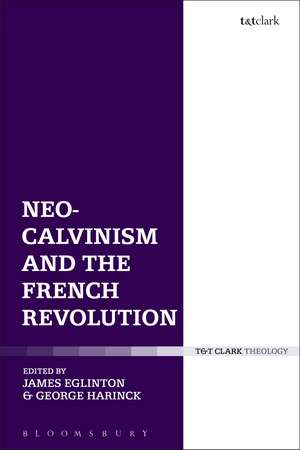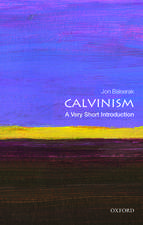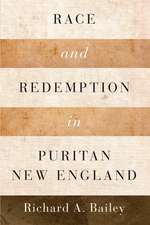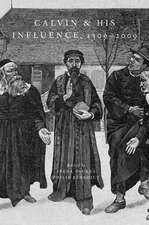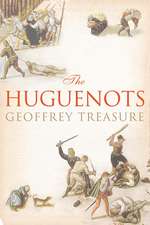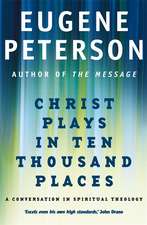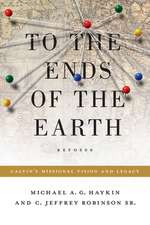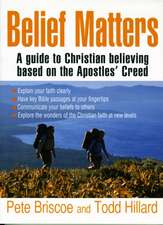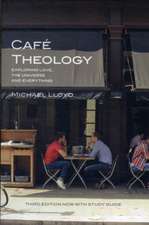Neo-Calvinism and the French Revolution
Editat de Dr James Eglinton, George Harincken Limba Engleză Hardback – 27 aug 2014
| Toate formatele și edițiile | Preț | Express |
|---|---|---|
| Paperback (1) | 256.49 lei 43-57 zile | |
| Bloomsbury Publishing – 24 feb 2016 | 256.49 lei 43-57 zile | |
| Hardback (1) | 773.14 lei 43-57 zile | |
| Bloomsbury Publishing – 27 aug 2014 | 773.14 lei 43-57 zile |
Preț: 773.14 lei
Preț vechi: 1112.53 lei
-31% Nou
Puncte Express: 1160
Preț estimativ în valută:
147.94€ • 154.88$ • 122.41£
147.94€ • 154.88$ • 122.41£
Carte tipărită la comandă
Livrare economică 07-21 aprilie
Preluare comenzi: 021 569.72.76
Specificații
ISBN-13: 9780567656636
ISBN-10: 0567656632
Pagini: 224
Ilustrații: 2 illus
Dimensiuni: 156 x 234 x 14 mm
Greutate: 0.49 kg
Ediția:New.
Editura: Bloomsbury Publishing
Colecția T&T Clark
Locul publicării:London, United Kingdom
ISBN-10: 0567656632
Pagini: 224
Ilustrații: 2 illus
Dimensiuni: 156 x 234 x 14 mm
Greutate: 0.49 kg
Ediția:New.
Editura: Bloomsbury Publishing
Colecția T&T Clark
Locul publicării:London, United Kingdom
Caracteristici
Helps readers to understand better the social and intellectual context within which neo-Calvinism developed
Notă biografică
James Eglinton is Meldrum Lecturer in Reformed Theology, University of Edinburgh, UK. George Harinck is Professor of Church History at the VU University Amsterdam and Kampen Theological University, The Netherlands.
Cuprins
List of contributors Foreword (Paul Wells) Preface (James Eglinton and George Harinck) 1. Abraham Kuyper and the French Revolution (James Bratt) 2. Herman Bavinck and the French Revolution (George Harinck) 3. From Babel to Pentecost via Paris and Amsterdam: Multilingualism in Revolutionary and neo-Calvinist Thought (James Eglinton) 4. The Revolution and the Reformed: Learning from History (Mark Elliott) 5. The Theo-Politics of Fashion: Groen van Prinsterer and the "Terror" of French Revolutionary Dress (Robert Covolo) 6. Long Films about Love: Kuyper and Kieslowski's Three Colours Trilogy (Alissa Wilkinson) 7. Dutch Orthodox Protestant Parties and the Ghost of the French Revolution (Ewout Klei) 8. Kuyper's Anti-Revolutionary Doctrine of Scripture (Hans Burger) 9. 'Marie Antoinette' or mystical depth? Herman Bavinck on theology as queen of the sciences (Wolter Huttinga) 10. French Secularity and the Islamic Headscarf: A Theological Deconstruction (Matthew Kaemingk) 11. Another Revolution: Towards a new explanation of the rise of neo-Calvinism (Hugo den Boer) Bibliography
Recenzii
The essays are each high in quality ... [This book is] necessary for one engaged in neo-Calvinistic studies.
The book, part of the T&T Clark Theology series, offers an eclectic collection of essays using methods of historical and systematic theology to analyze and apply the interpretations of the French Revolution offered by these neo-Calvinist thinkers. ... [The chapters] address a wide variety of topics.
[This] book poses - and answers - many fascinating questions. This volume will be of use not only to those with an interest in neo-Calvinism but also the French Revolution and in the secularisation of Europe
These essays offer us profound neo-Calvinist explorations of the deeply anti-Christian roots of the French Revolution. But they give us much more, with marvelous commentaries on film, fashion, literature, political theory and contemporary Islam--to say nothing of some creative perspectives on important issues in basic theology!
Does Abraham Kuyper's claim that the ideas of the French Revolution were the Original Sin of modernity hold up under the careful scrutiny of contemporary historians? The answer, suggested by this uniformly high-quality collection of essays ranging from discussions of uniformity versus multi-linguisticality to the "terror" of French Revolutionary dress and even to French secularity and the Islamic headscarf, is a qualified "yes." None of the essayists are slavish disciples of the Kuyperian tradition; all treat it sympathetically and mine it for its contemporary relevance. Students of Dutch neo-Calvinism will find this volume stimulating in its exploration of old and new themes and an indispensable resource for applying the valuable insights of this tradition today.
How to reconcile the roots of faith with the potential of modernity? This volume presents fresh and interesting insights into the complicated relationship between calvinism and modern culture. The French Revolution functions as the landmark that launched a plethora of reactions and developments, which were formative for the movement that became known as Neocalvinism. The creative contributions of younger and distinguished scholars show how the questions and answers do not only belong to a distant past, but are vibrant and challenging in our current situation.
The book, part of the T&T Clark Theology series, offers an eclectic collection of essays using methods of historical and systematic theology to analyze and apply the interpretations of the French Revolution offered by these neo-Calvinist thinkers. ... [The chapters] address a wide variety of topics.
[This] book poses - and answers - many fascinating questions. This volume will be of use not only to those with an interest in neo-Calvinism but also the French Revolution and in the secularisation of Europe
These essays offer us profound neo-Calvinist explorations of the deeply anti-Christian roots of the French Revolution. But they give us much more, with marvelous commentaries on film, fashion, literature, political theory and contemporary Islam--to say nothing of some creative perspectives on important issues in basic theology!
Does Abraham Kuyper's claim that the ideas of the French Revolution were the Original Sin of modernity hold up under the careful scrutiny of contemporary historians? The answer, suggested by this uniformly high-quality collection of essays ranging from discussions of uniformity versus multi-linguisticality to the "terror" of French Revolutionary dress and even to French secularity and the Islamic headscarf, is a qualified "yes." None of the essayists are slavish disciples of the Kuyperian tradition; all treat it sympathetically and mine it for its contemporary relevance. Students of Dutch neo-Calvinism will find this volume stimulating in its exploration of old and new themes and an indispensable resource for applying the valuable insights of this tradition today.
How to reconcile the roots of faith with the potential of modernity? This volume presents fresh and interesting insights into the complicated relationship between calvinism and modern culture. The French Revolution functions as the landmark that launched a plethora of reactions and developments, which were formative for the movement that became known as Neocalvinism. The creative contributions of younger and distinguished scholars show how the questions and answers do not only belong to a distant past, but are vibrant and challenging in our current situation.
